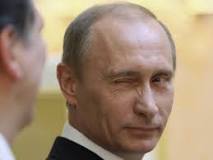Russia sympathisers vent anger at Ukraine Odessa deaths

Russia sympathisers vent anger at
Ukraine Odessa deaths
3 May 2014 Last updated at 18:37
Pro-Russia supporters in the
Ukrainian city of Odessa have
voiced their anger a day after 42
people were killed.
Friday’s clashes culminated in a
major fire at a trade union building
where most of the deaths occurred.
Hundreds of people gathered there
on Saturday.
The protest comes as Ukraine says it
has seized a security building from
rebels in the east of the country.
Seven international monitors held by
pro-Russian activists in eastern
Ukraine were released earlier.
US Secretary of State John Kerry and
his Russian counterpart, Sergei
Lavrov, have again spoken by phone
about the crisis.
Mr Lavrov urged Mr Kerry to put
pressure on Kiev to stop its military
operation, which he said risked
“plunging the country into a
fratricidal conflict”.
Mr Kerry said Moscow should stop
backing the pro-Russian separatists.
Both men also discussed the
possibility of greater involvement by
the Organization for Security and Co-
operation in Europe (OSCE) in trying
to find a solution to the crisis.
Grief and anger were evident outside
the burned out trade union building
in Odessa

Ukrainian troops man checkpoints
round the rebel-held town of
Sloviansk
The Ukrainian government claimed
some success in its military
operation in Kramatorsk
The violence in Odessa was the most
serious in Ukraine since February
when more than 80 people were
killed during protests in Kiev against
the ousted President Viktor
Yanukovych.
Groups sympathetic to Russia, some
armed, are reported to have attacked
a larger protest against separatism.
Skirmishes between the two groups
then broke out in several parts of
the south-western city.
Pro-Russia protesters are later said
to have sought refuge in the trade
union building after their
encampment was burned down.
Petrol bombs were thrown leading to
the deaths of at least 36 people
inside, according to official figures.
The blackened trade union building,
its windows broken, was ringed by
police on Saturday as the crowd
assembled. Some laid flowers; others
chanted pro-Russian slogans.
There were isolated scuffles between
rival groups and Ukrainian flags were
burned or bundled away.
Military operation
Early on Saturday, the Kiev
government resumed military action
against Russian separatists in the
east of the country, with fighting
reported in some areas.
In Kramatorsk, south of rebel-held
Sloviansk, Ukrainian forces
recaptured the headquarters of the
SBU security service from pro-
Russian separatists, according to the
interior ministry.
Interior Minister Arsen Avakov said
the “active phase” of the military
operation was continuing, with
Ukrainian forces also taking a
television tower in Kramatorsk.
The defence ministry also reported
“serious fighting” on Friday night in
Andreevka, some 6km (4 miles) west
of rebel-held Sloviansk, with two
Ukrainian soldiers killed.
Ten separatists were killed in
Andreevka, a spokeswoman for the
pro-Russian force in Sloviansk said.
‘Without conditions’
The seven international military
observers freed early on Saturday
were captured a week ago and held
in Sloviansk.
Separatist leader Vyacheslav
Ponomaryov (left) said the observers
left after celebrating his birthday
German Col Axel Schneider praised
his observer team’s attitude
There was a heavy police presence in
Odessa as hundreds gathered
outside the burned out trade union
building
A pro-Russian activist and a pro-
Ukraine supporter scuffle for a
Ukrainian flag in Odessa on Saturday
Five Ukrainian officers captured with
the observers, who are linked to the
OSCE, were also released.
Pro-Russian separatists in Sloviansk
say they released the observers
“without conditions”.
“As I promised them, we celebrated
my birthday yesterday and they left.
As I said, they were my guests,” the
self-proclaimed mayor of Sloviansk,
Vyacheslav Ponomaryov, said.
Russia had sent an envoy to
negotiate the releases. Vladimir
Lukin said he hoped the “voluntary
act” by the separatists would be
reciprocated by Kiev, adding: “I
would very much like military actions
to end.”
One of the observers, German Col
Axel Schneider, said the team had
been treated “as good as possible”
in what was a “miserable situation”.
Western leaders had condemned the
abductions.
The observers – four Germans, a
Dane, a Pole and a Czech – are not
part of the main OSCE monitoring
mission, which was agreed after long
negotiations by Russia, Ukraine and
the US.























